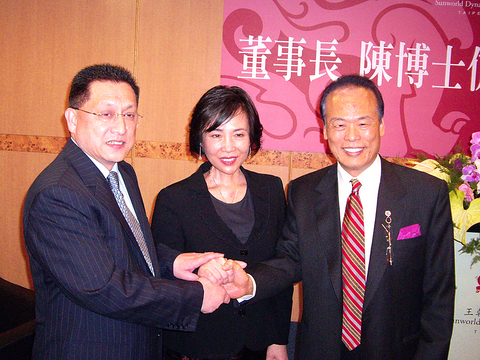After taking over Holiday Inn Asiaworld Taipei in September and renaming it Sunworld Dynasty Hotel Taipei (
"I'm quite optimistic about Taiwan's economy and environment. It doesn't matter whether Taiwan has direct links with China or not. This small island has great potential," said Chen, who built his name and wealth via Sunrider International (
Chen, who usually shies away from the press, yesterday made his first public appearance in Taipei to introduce the hotel's new management team after acquiring Sunworld Dynasty with his wife Chen Oi-lin (陳徐愛蓮), president of Sunrider.

PHOTO: JACKIE LIN, TAIPEI TIMES
Chen last year made his first transition into the hotel industry by buying three hotels in Taiwan and China for over NT$11 billion (US$330 million). He has invested an undisclosed amount in the five-star Sheraton Taipei.
Early last year, Chen took in Tianlun Dynasty Hotel (天倫王朝飯店) and Tianlun Songhe Hotel (天倫松鶴大酒店), both in Beijing, for over NT$4 billion. In May, he secured Holiday Inn Asiaworld Taipei for NT$7.04 billion after three public auctions to sell the poorly performing hotel failed.
These deals were fairly cheap considering their good locations in downtown areas, he said, adding that the firm would continue to hunt for ideal takeover targets in Shanghai, Hong Kong and Taiwan, with possibilities also extending to Japan, South Korea, Australia and South Africa.
"The reason I stepped into the hotel industry is I want to integrate my business with culture and fashion," said Chen, who graduated from the pharmacy department of Kaohsiung Medical University.
With nearly 1 million Sunrider distributors in 40 nations, Chen plans to integrate resources and express his passion for fashion and image through his hotels. He said he will display some of his thousands of Chinese art collections -- currently stored in a museum in California -- in Sunworld Dynasty after an overall refit is completed.
Located at the intersection of Dunhua N Road and Nanjing E Road near Songshan Airport, Sunworld Dynasty was founded by Asiaworld Group (亞世集團) 25 years ago to become the nation's first hotel integrated with a department store.
However, lack of maintenance in recent years made the 750-room hotel appear rundown, which caused it to lose some of its competitive edge.
Chen expected the large-scale renovation -- including the outer walls, guest rooms, restaurants, ballrooms and basement parking space -- to take three years and over NT$2 billion to complete.
"We do not plan to demolish it for reconstruction as the hotel itself has a modern design. But after the face-lift, I'm confident it'll bloom for another two to three decades," Chen said.
He expected Sunworld Dynasty to rake in annual sales of up to NT$1.5 billion, from the current NT$900 million, by upgrading it to a five-star hotel with four-star rates.
In addition, because of his close relations with Sheraton Taipei, these two hotels will refer customers when one is fully booked, he said.
Chen yesterday also introduced the hotel's new general manager, Victor Chou (
He has participated in preparation at the Brother Hotel, The Sherwood Taipei and Ta Shee Resort, as well as management at the Sheraton Taipei.

Intel Corp chief executive officer Lip-Bu Tan (陳立武) is expected to meet with Taiwanese suppliers next month in conjunction with the opening of the Computex Taipei trade show, supply chain sources said on Monday. The visit, the first for Tan to Taiwan since assuming his new post last month, would be aimed at enhancing Intel’s ties with suppliers in Taiwan as he attempts to help turn around the struggling US chipmaker, the sources said. Tan is to hold a banquet to celebrate Intel’s 40-year presence in Taiwan before Computex opens on May 20 and invite dozens of Taiwanese suppliers to exchange views

Application-specific integrated circuit designer Faraday Technology Corp (智原) yesterday said that although revenue this quarter would decline 30 percent from last quarter, it retained its full-year forecast of revenue growth of 100 percent. The company attributed the quarterly drop to a slowdown in customers’ production of chips using Faraday’s advanced packaging technology. The company is still confident about its revenue growth this year, given its strong “design-win” — or the projects it won to help customers design their chips, Faraday president Steve Wang (王國雍) told an online earnings conference. “The design-win this year is better than we expected. We believe we will win

Chizuko Kimura has become the first female sushi chef in the world to win a Michelin star, fulfilling a promise she made to her dying husband to continue his legacy. The 54-year-old Japanese chef regained the Michelin star her late husband, Shunei Kimura, won three years ago for their Sushi Shunei restaurant in Paris. For Shunei Kimura, the star was a dream come true. However, the joy was short-lived. He died from cancer just three months later in June 2022. He was 65. The following year, the restaurant in the heart of Montmartre lost its star rating. Chizuko Kimura insisted that the new star is still down

While China’s leaders use their economic and political might to fight US President Donald Trump’s trade war “to the end,” its army of social media soldiers are embarking on a more humorous campaign online. Trump’s tariff blitz has seen Washington and Beijing impose eye-watering duties on imports from the other, fanning a standoff between the economic superpowers that has sparked global recession fears and sent markets into a tailspin. Trump says his policy is a response to years of being “ripped off” by other countries and aims to bring manufacturing to the US, forcing companies to employ US workers. However, China’s online warriors